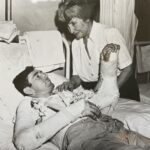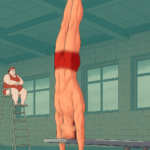Publishing, Parachuting, and Three Lincolns
Dear Reader,
Thank you for joining me on the long road to publishing my novels. If you stick with me, I hope you’ll get to experience the entire writer’s journey, from novice to veteran, as I mature in the craft.
A year from now, I hope I will no longer be wondering “Will I ever get published?” Instead, I hope to be puzzling over new issues, like balancing the demands of communicating with readers and completing my next book on schedule.
Many published authors struggle with “imposter syndrome,” the sense that they aren’t real writers. They are fakers—and sooner or later everybody is going to know it. This condition arises when subsequent novels resist being born and from whatever seems like “failure.” Tremendous writers—even Madeleine L’Engle and F. Scott Fitzgerald—fell into despair over their writing. I hope that won’t be my story.
As a child, I wished to be “perfect,” as if that were possible. But parenting and practicing medicine taught me there is no perfection on this earth. (If you are my medical patient, rest assured I will still do my best for you!) But I give myself permission to “fail,” to write poorly. Half a century it took me to arrive here, but how freeing.
How fortunate for me that I don’t abuse alcohol like Fitzgerald, that I’m not dependent on writing to pay my bills, and that I have faith in God, who gives me hope beyond the grave. I’d love for my novels to endure 500 years, to enrich hearts and minds for generations, but very few writers succeed so well, and even those who do don’t know what they have accomplished.
I desire to reach readers who will delight in my work, read it to their children, reread it in their old age, laugh at the folly, memorize the songs, think deeper than before, and find purpose through their suffering. So I’m sending my queries to agents around the globe, at least two per week for the next two months. Today I wrote to a pair of literary agents who respond to just one of every 200 requests they receive. Imagine launching basketball shots from three-quarters court—“Hail Marys” as the athletes call them. That’s what I did today. I have adequate strength, decent aim, and plenty of arc for the long shots, but will one of them ever drop through the rim? If so, how long will it take? When should I leave the half-court bombs behind and scoot up to the free throw line? Even free throws can be hard in the writing world.
It’s not enough to simply find an agent who will publish my work. There must be a proper fit. The author and the agent must become a team for the long haul. Literary partners need to trust each other, respect each other, desire the best for each other. In what ways do I need to grow to make such a partnership happen? I’ll keep you informed.
An established author once told me, regarding publication, “Be careful what you wish for.” He seemed to be longing for the days before he was published, when he felt freer, and when everything was brand new. His wistful eye reminded me of something uncanny.
* * *
In the early 1990s, I was the best man for my brother’s wedding. For his bachelor party, we didn’t want to do anything immoral, so we decided to try something dangerous, instead: parachuting. My wife made me promise never to do it again.
We signed waivers, releasing the parachute company of all liability.
Our training was simple. We practiced the proper landing techniques. We learned the idea of crossing the target landing site going with the wind 400 feet above the ground, then turning back into the wind when only 200 feet above the ground—about the height of mature trees. We learned to pull down on our steering handles once close to the ground to convert linear momentum into lift. If everything went perfectly, we might land upright, on our feet, as if stepping off an elevator. That assumed a fifteen-mile-per-hour wind heading one way and a fifteen-mile-per-hour landing speed in the other.
My chute was set to pull automatically after three to five seconds of freefall. If it got tangled, I was to untangle the ropes with my hands. If that failed, I was to look at the emergency handle on my chest, grab it with two hands, and pull it straight out to deploy the backup parachute. Easy.
There would be three commands: get out, get all the way out and hang, and go. There were two of us jumpers in my plane. The guy ahead of me was a member of the bachelor party, and he stood almost seven feet tall. He had only two or three fingers on each hand. “Get out,” the instructor said. The big man stuck his huge feet out of the moving airplane. “Get all the way out and hang.”
The giant’s feet caught the wind, and he fell. Not enough fingers.
My turn.
Get out.
Get all the way out and hang.
A funny thing happens as you hang beneath the wing of an airplane. You can’t think well. Four hours of training had seemed like so much overkill when back on the ground.
I remembered you are supposed to jettison your chute if it gets tangled. But how long do you try to untangle the ropes? Time stands still when you hang.
You aren’t supposed to land between lines of dots on the fields below. Those dots are telephone poles. There’s an invisible wire between them carrying 4,000 amps and 380,000 volts. Also, that wire is fifty feet in the air.
Go.
After you drop from an airplane—and hopefully you don’t have children yet—there’s a singular moment, an extraordinary moment, when you look up and realize you might not die. Your chute has deployed.
You can’t see any dots below. You identify the landing site, cross it high in the air, and then turn back toward the target zone. Your feet strike the ground and slide out from under you—because you aren’t really stepping off an elevator. You land on your butt, scrape it deep, and it hurts. Your heart is racing 180 beats per minute, and it stays there for forty-eight hours. You don’t sleep for two days.
A fully attired veteran parachuter with piercing eyes walks past you en route to his plane. He turns and studies your face, searching for something. Longing for something. “First time?” he says.
There is never another jump like the first one.
* * *
The history of Memorial Day in the U.S. dates back to the aftermath of the American Civil War in the late 1860s. But in my mind, it goes back to Abraham Lincoln and the Gettysburg Address.
Four score and seven years ago our fathers brought forth, on this continent, a new nation, conceived in Liberty, and dedicated to the proposition that all men are created equal. Now we are engaged in a great civil war, testing whether that nation, or any nation so conceived and so dedicated, can long endure. We are met on a great battle-field of that war. We have come to dedicate a portion of that field, as a final resting place for those who gave their lives that that nation might live. It is altogether fitting and proper that we should do this.
But, in a larger sense, we can not dedicate—we can not consecrate—we can not hallow—this ground. The brave men, living and dead, who struggled here, have consecrated it, far above our poor power to add or detract. The world will little note, nor long remember what we say here, but it can never forget what they did here. It is for us the living, rather, to be dedicated here to the unfinished work which they who fought here have thus far so nobly advanced. It is rather for us to be here dedicated to the great task remaining before us—that from these honored dead we take increased devotion to that cause for which they gave the last full measure of devotion—that we here highly resolve that these dead shall not have died in vain—that this nation, under God, shall have a new birth of freedom—and that government of the people, by the people, for the people, shall not perish from the earth.
Abraham Lincoln
Delivered at the dedication of the Soldiers’ National Cemetery
Gettysburg, Pennsylvania, November 19th, 1863
Lincoln spoke eighty-seven years after the birth of the United States of America. Eighty-one years later, on June 6th, 1944, came the D-day invasion of Normandy. My mother was born the following day. And now, at last, on June 7th, 2024, Sharon Thompson turns eighty. Happy Birthday, Mom.
Three “Lincolns” have elapsed from the birth of this nation until today. Four score and seven years from Independence to Gettysburg, four score and one from Gettysburg to Normandy, and four score more from Normandy until today. Two hundred forty-eight years. That’s it. Three Lincolns.
Please consider subscribing to my newsletter!
I need to expand to an audience of 10,000 readers!
If you liked this post, please send it to a friend. If the reading audience grows, agents and publishers become suddenly far more keen on joining in the Adventures of TAT!
Copy URL to Clipboard






7 responses to “Publishing, Parachuting, and Three Lincolns”
Great writing as always, Troy!
Dr. Troy: I love how you connect adventure, humor, historical facts , personal adventure with
a refreshing twist of fun. To read your writing is to come away with a smile. Ann W
Thank you, Ann.
Thanks, Ann. TAT
Wow. Great writing. So many different ideas converging.
Gripping sky diving story. Sure glad you and your brother didn’t tell me about this until YEARS later. Love the Lincolns. Thanks for the Happy Birthday, my son.
Which part of the skydiving did I not tell you about? The big guy who fell?
My heart rate rose reading about your plummet!! Thanks for sharing!